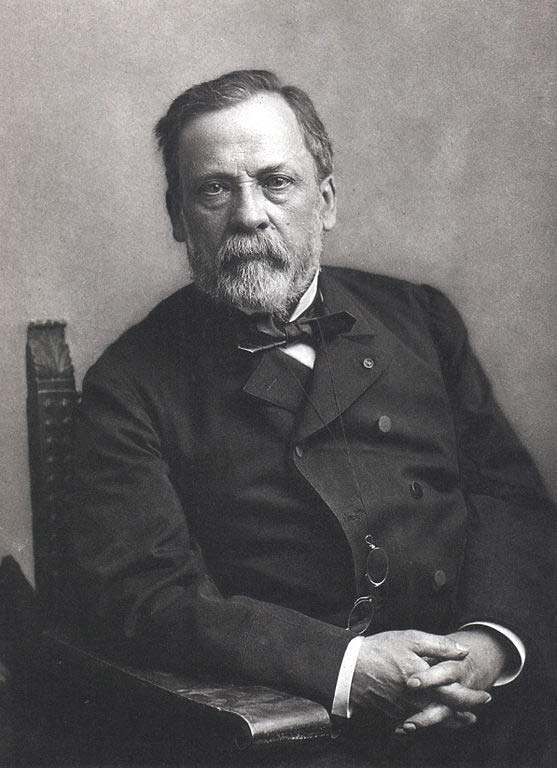| Louis Pasteur | |
|---|---|
 |
|
| Scientist | |
| Specialty | Chemistry, microbiology |
| Born | Dec. 27, 1822 Dole, France |
| Died | Sep. 28, 1895 (at age 72) Marnes-la-Coquette, France |
| Nationality | French |
Louis Pasteur was a famous French chemist and microbiologist. He is best known for his great discoveries of the vaccination principles, pasteurization and microbial fermentation. Today, we remember Louis for his amazing breakthroughs in the different causes and prevention of various illnesses. Due to his discoveries, many diseases have been prevented and countless lives have been saved. Louis was able to reduce mortality from puerperal fever. He also created the very first vaccine for anthrax and rabies.
The great medical discoveries were able to provide direct support for germ theory of disease together with its application in the clinical medicine. Many people remember Louis Pasteur as the man who invented the technique of treating wine and milk in order to deter bacterial contamination, which is a process referred as pasteurization. Scientists regard him as one among the three main founders of bacteriology. Other founders are Robert Koch and Ferdinand Cohn.
Pasteur’s Early Life
Louis was born on December 27, 1822, in France. He was born as the third child into a Catholic family that was quite poor. In 1827, the family decided to move to Arbois. Here, Louis joined primary school in 1831. During his early years, he was an average student. This was because he found fishing and sketching more interesting. Actually, he made some beautiful portraits of his parents and close friends when he was just 15 years old. These pastels and portraits are now kept in a museum in Paris.
In 1838, Louis left for Paris to join Institution of Barbet. However, he became homesick and chose to return home. He joined college the following year and earned his BA degree. In 1846, he was appointed the professor of physics at the College de Turmon.
After a while, he went to Ecole Normale Superieure to work as a graduate assistant. In 1848, he briefly served as a professor of physics and soon after that, he joined the University of Strasbourg as professor of chemistry. This is where he met Marie Laurent in 1849. They got married and had five children together.
Pasteur’s Career
Louis Pasteur became the chair of chemistry in the University of Strasbourg. In 1854, he was named the dean of new faculty of sciences at Lille University. Two years later, he moved to Paris. He took control of the Ecole Normale between the years 1858 and 1867 and started a series of reforms. He introduced a reform in examinations that led to better results, competition, and increased prestige. Louis even raised the standards of scientific work and this led to two serious revolts from the students.
In 1862, Pasteur was appointed professor of physics, geology and chemistry; he held this position until 1867, when he resigned. In 1887, he founded the Pasteur Institute in Paris. He was the director of the institute for the rest of his life.
Germ Theory of Fermentation
Pasteur demonstrated that fermentation is basically caused by growth of micro-organisms and bacteria in nutrients broths. This is not due to spontaneous generation but rather bio-genesis. Louis was not the first person to propose the germ theory since others had suggested this earlier.
However, he developed and even conducted all the experiments to prove this theory. He also conducted a research that proved that growth of microorganisms was the reason behind the spoiling of beverages such as milk, beer, and wine.
The contamination of beverages gave Pasteur the idea that microorganisms infecting humans and other animals caused illness. He proposed the prevention of microorganisms from entering the human body. These discoveries led to the development of antiseptic methods in surgery. He also discovered anaerobiosis, a process where microorganisms develop and live without oxygen.
Immunology and Vaccination
Louis Pasteur also worked on chicken cholera. Later in 1870, he applied his immunization technique to anthrax, which affected cattle. This also aroused interest in combating other illnesses. He publicly said that he had made this anthrax vaccine by exposing bacilli to oxygen. Louis also discovered that some weak forms of disease could be used as immunization against the stronger forms and that rabies was simply transmitted by various viruses that are too small to be seen under the microscopes.
Louis Pasteur also introduced the medical world to the idea of viruses. After opening the Pasteur Institute, he had a rough time trying to convince other scientists of his great ideas. He fought to convince surgeons that germs existed and that dirty instruments and hands spread germs and disease.